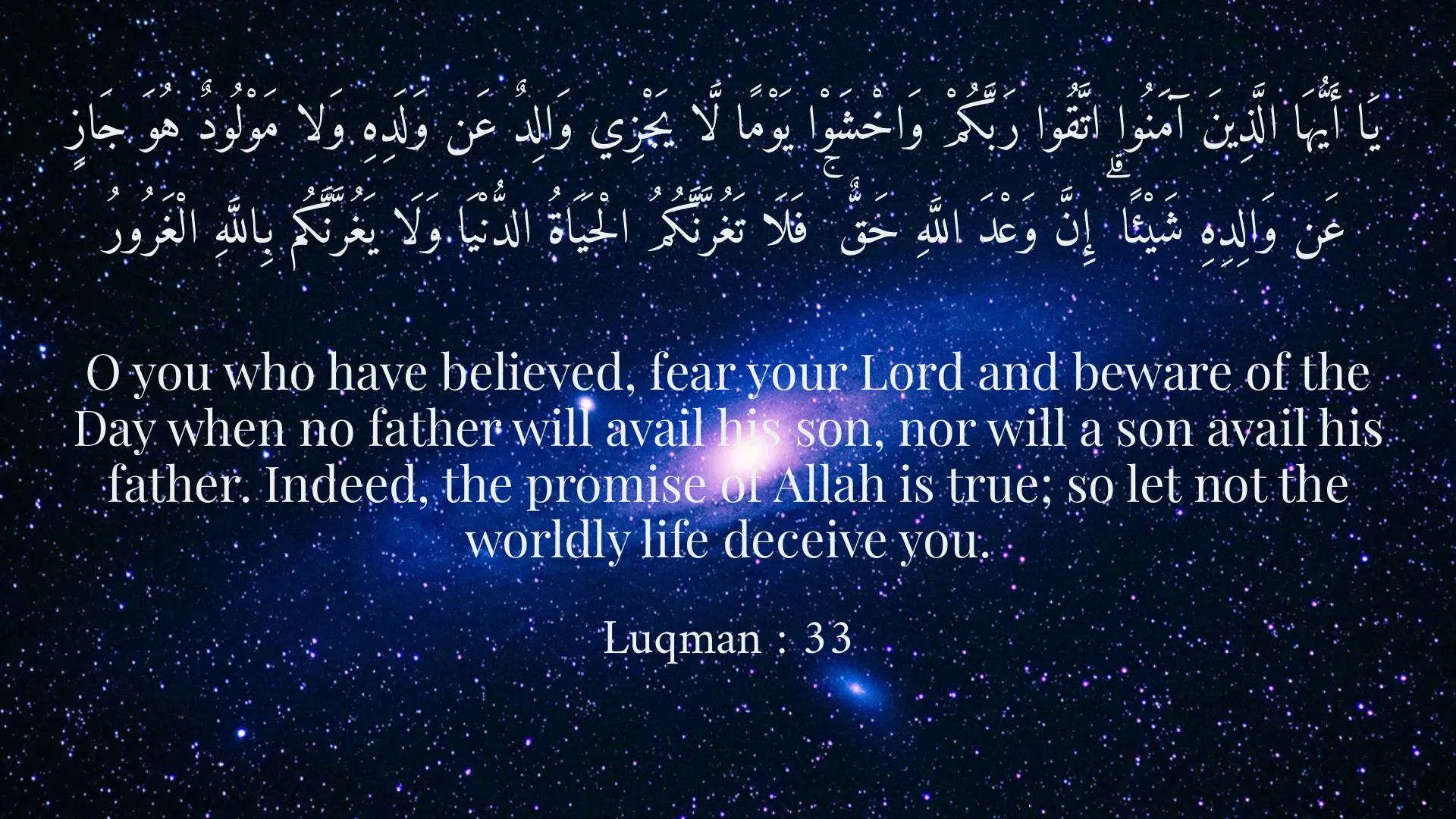Quranic Answer

The Concept of Hope in the Holy Quran: Balancing Reality and Aspiration The journey of life is often riddled with difficulties and challenges, calling upon individuals to summon courage and resilience as they navigate through turbulent waters. In this context, the Holy Quran presents a profound discourse regarding the concept of hope. Rather than merely being a vague aspiration, hope, as depicted in the Quran, is rooted in reality and constructively encourages believers to engage with their lives in meaningful ways. It emphasizes that while hope is an essential component of faith, it must be balanced by a clear understanding of reality. Throughout the Quran, the notion of hope is frequently coupled with warnings, providing a holistic perspective on human existence. Surah Luqman, verse 33, serves as a striking example of this interrelationship: "O people! Fear your Lord and beware of the Day when no father will avail his son, nor will a son avail his father. Nothing will help you then." This verse captures the essence of accountability before Allah, underscoring the importance of sincere hope entwined with a fear of divine judgment. Here, the concept of hope is not devoid of responsibility; rather, it is intricately connected to a person's actions and ethical considerations. The verse emphasizes that viewers should approach hope constructively and be cautious of harboring unrealistic expectations. Indeed, the danger of nurturing hope without an anchoring in reality can lead an individual astray. These baseless illusions detach individuals from their immediate duties and obligations, crafting a false sense of security that may culminate in misguidance and disappointment. Thus, the Quran stresses the importance of recognizing the limits of human control and emphasizing reliance on divine guidance. In a complementary manner, Surah Al-Isra, verse 82 states, "And We send down in the Quran that which is healing and mercy for the believers, but it increases the evildoers in nothing but loss." This verse beautifully encapsulates the promise of solace and healing embedded within the Quran for those who embrace its teachings. Here, the act of believing is central. Hope in the instructions and promises of Allah is akin to a balm that nurtures the soul and fosters peace within the heart. Conversely, for the evildoers—those who turn away from righteousness—this same scripture serves only as a source of further loss and estrangement. Just as hope must be rightly grounded, so too must intentions. A key underlying theme is the recognition that genuine hope, interwoven with faith and virtuous actions, creates a protective shield against despair and hopelessness, facilitating a harmonious life. The fundamental takeaway for believers is that hope should act as a guide rather than a crutch. When hope is grounded in the reality of Allah's word and His promises, individuals are propelled toward constructive action and ethical living. On the other hand, hope that merely seeks comfort without accountability can lead to complacency. The Quran encourages reflection on one's circumstances and the necessity of engaging with life's trials with both optimism and realism. Moreover, focusing solely on false hope may leave individuals disillusioned in times of adversity. Many may adopt unfounded expectations, leading them to ignore their skills, capabilities, and responsibilities that could facilitate the overcoming of tribulations. Instead, the Quran advocates for cultivating a belief that is proactive yet respectful of divine wisdom. This does not merely involve waiting for divine intervention but rather actively participating in one’s betterment while being mindful of the boundaries established by Allah. Indeed, cultivating hope is an essential part of the human experience. However, it must be paired with an understanding of one’s duties, the transient nature of worldly affairs, and the reality of reliance on divine guidelines. The Quran serves as a beacon of light, urging individuals to enrich their lives through true belief, constructive hope, and devout practice. In summary, as believers, it is vital that our hope be intertwined with our actions and shaped by our fears and consciousness of Allah. True hope is not merely about wishing for a better future; it is a commitment to striving for goodness and righteousness. The Quran reminds us that legitimate hope fosters resilience against challenges while grounding us in truth. Just as a plant needs both soil and sunlight to flourish, genuine hope thrives on a strong foundation of reality and the knowledge of divine mercy. Therefore, in our pursuit of happiness and fulfillment, we must ensure that our hopes are not built on illusions but rooted firmly in trust in God and adherence to His commands. In every trial we face, let our faith be our anchor, for hope that aligns with reality guides us toward salvation and peace.
Related Verses
يَا أَيُّهَا الَّذِينَ آمَنُوا اتَّقُوا رَبَّكُمْ وَاخْشَوْا يَوْمًا لَّا يَجْزِي وَالِدٌ عَن وَلَدِهِ وَلا مَوْلُودٌ هُوَ جَازٍ عَن وَالِدِهِ شَيْئًا ۗ إِنَّ وَعْدَ اللَّهِ حَقٌّ ۚ فَلَا تَغُرَّنَّكُمُ الْحَيَاةُ الدُّنْيَا وَلَا يَغُرَّنَّكُم بِاللَّهِ الْغَرُورُ
O you who have believed, fear your Lord and beware of the Day when no father will avail his son, nor will a son avail his father. Indeed, the promise of Allah is true; so let not the worldly life deceive you.
Luqman : 33
وَنُنَزِّلُ مِنَ الْقُرْآنِ مَا هُوَ شِفَاءٌ وَرَحْمَةٌ لِّلْمُؤْمِنِينَ وَلَا يَزِيدُ الظَّالِمِينَ إِلَّا خَسَارًا
And We send down in the Quran that which is healing and mercy for the believers, but it increases the evildoers in nothing but loss.
Al-Isra : 82
Short Story
Once, there was a young man named Hasan, who always lived with false hopes and dreams. He believed he could achieve success without effort, simply relying on his wishes. However, he became acquainted with the teachings of the Quran and realized he must pay attention to realities and work towards his goals. Thus, with trust in God, Hasan followed his plans and succeeded, finding greater peace in his life.